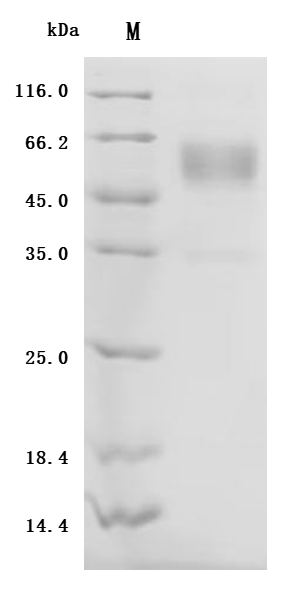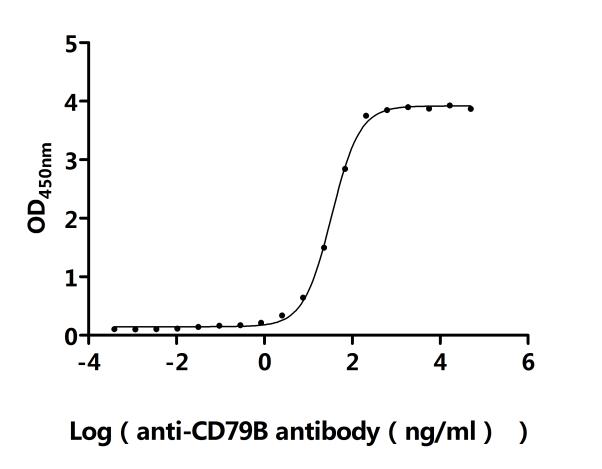The recombinant human CD79B protein is expressed from HEK293 cells with 10*His tag and Avi tag at the C-Terminus. The target gene encodes the 29-159aa of the human CD79B. Its purity reaches up to 90% as determined by SDS-PAGE, and its endotoxin level is Less than 1.0 EU/ug as accessed by the LAL method. Its activity is measured by its binding ability with the anti-CD79B recombinant antibody (CSB-RA004958MA2HU) in a functional ELISA. The EC50 of this CD79B protein is 31.97-35.69 ng/mL.
The CD79B protein, a critical component of the B-cell receptor (BCR), serves several essential functions in B-cell biology and immunology. As a transmembrane protein, CD79B pairs with CD79A to form the BCR complex, which is crucial for B-cell activation, signaling, and development. The primary role of CD79B is to facilitate signal transduction upon antigen engagement, which is initiated by the phosphorylation of immunoreceptor tyrosine-based activation motifs (ITAMs) located in its cytoplasmic domain [1][2]. This phosphorylation event activates downstream signaling pathways involving various kinases, such as SYK and BLNK, leading to B-cell proliferation, differentiation, and survival [1][3][4].
Mutations in the CD79B gene, particularly in the ITAM region, have been associated with persistent BCR signaling, which can contribute to the survival of malignant B cells in conditions such as diffuse large B-cell lymphoma (DLBCL) [1][5][6]. These mutations can inhibit normal receptor internalization, resulting in enhanced BCR expression on the cell surface, which further promotes cell activation and survival [1][7].
Moreover, CD79B plays a role in the immune response beyond mere signal transduction. It has been implicated in the modulation of immune responses, where antibodies targeting CD79B can induce anergy in B cells, potentially preventing autoimmunity [8][9]. This suggests that CD79B not only facilitates B-cell activation but also has regulatory functions that can influence the overall immune landscape.
In the context of cancer, CD79B expression is often used as a biomarker for B-cell malignancies, and therapies targeting CD79B, such as antibody-drug conjugates, have shown promise in treating various B-cell lymphomas [6][10]. The ability of CD79B to mediate both positive and negative signals in B cells highlights its dual role in promoting immune responses while also providing a target for therapeutic intervention in malignancies.
References:
[1] W. Zhang, C. Huang, J. Liu, L. Wu, H. Zhang, X. Wu, et al. Genomic mutation landscape of primary breast lymphoma: next-generation sequencing analysis, Disease Markers, vol. 2022, p. 1-9, 2022. https://doi.org/10.1155/2022/6441139
[2] M. Mayzel, J. Rosenlow, L. Isaksson, & V. Orekhov. Time-resolved multidimensional nmr with non-uniform sampling, Journal of Biomolecular NMR, vol. 58, no. 2, p. 129-139, 2014. https://doi.org/10.1007/s10858-013-9811-1
[3] Z. Kuang, L. Guo, & X. Li. Identification of key genes and pathways associated with classical hodgkin lymphoma by bioinformatics analysis, Molecular Medicine Reports, vol. 16, no. 4, p. 4685-4693, 2017. https://doi.org/10.3892/mmr.2017.7158
[4] J. Müller-Winkler, R. Mitter, J. Rappe, L. Vanes, E. Schweighoffer, H. Mohammadi, et al. Critical requirement for bcr, baff, and baffr in memory b cell survival, The Journal of Experimental Medicine, vol. 218, no. 2, 2020. https://doi.org/10.1084/jem.20191393
[5] A. Arai, H. Takase, M. Yoshimori, K. Yamamoto, M. Mochizuki, & O. Miura. Gene expression profiling of primary vitreoretinal lymphoma, Cancer Science, vol. 111, no. 4, p. 1417-1421, 2020. https://doi.org/10.1111/cas.14347
[6] S. Corcoran. Molecular determinants of sensitivity to polatuzumab vedotin in diffuse large b-cell lymphoma, Cancer Discovery, p. OF1-OF22, 2024. https://doi.org/10.1158/2159-8290.cd-23-0802
[7] M. Pfeifer, B. Zheng, T. Erdmann, H. Koeppen, R. McCord, M. Grau, et al. Anti-cd22 and anti-cd79b antibody drug conjugates are active in different molecular diffuse large b-cell lymphoma subtypes, Leukemia, vol. 29, no. 7, p. 1578-1586, 2015. https://doi.org/10.1038/leu.2015.48
[8] I. Hardy, N. Anceriz, F. Rousseau, M. Seefeldt, E. Hatterer, M. Irla, et al. Anti-cd79 antibody induces b cell anergy that protects against autoimmunity, The Journal of Immunology, vol. 192, no. 4, p. 1641-1650, 2014. https://doi.org/10.4049/jimmunol.1302672
[9] K. Renner, S. Neumayer, Y. Talke, S. Buchtler, K. Schmidbauer, F. Nimmerjahn, et al. B‐cell modulation with anti‐cd79b antibodies ameliorates experimental autoimmune encephalitis in mice, European Journal of Immunology, vol. 52, no. 4, p. 656-668, 2022. https://doi.org/10.1002/eji.202149523
[10] F. Fuh, C. Looney, D. Li, K. Poon, R. Dere, D. Danilenko, et al. Anti‐cd22 and anti‐cd79b antibody‐drug conjugates preferentially target proliferating b cells, British Journal of Pharmacology, vol. 174, no. 8, p. 628-640, 2017. https://doi.org/10.1111/bph.13697








